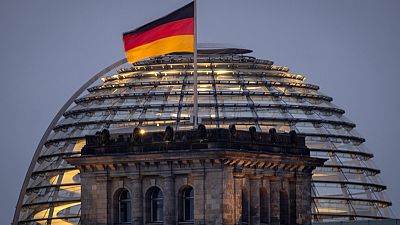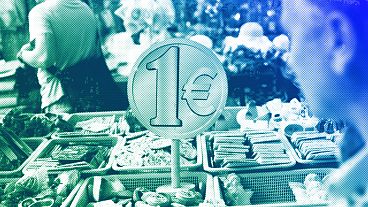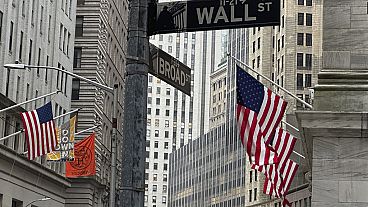The European Commission President credits the vaccine roll-out and the €750-billion recovery fund as the key elements behind the recovery.
The worst of the economic devastation brought upon by the coronavirus pandemic is nearing its end.
That was the main message of European Commission President Ursula von der Leyen during the Brussels Economic Forum, an annual economic event that brings together decision-makers, business leaders and prominent academic figures.
This year's edition was marked by a sense of optimism and hope against the bleak backdrop of a once-in-a-lifetime health crisis that has wreaked havoc across the European continent. Last year, the EU's economy contracted by 6.1% – a dramatic drop never seen before in the bloc's history.
"In our spring economic forecast, we projected our economy to grow by 4.2% this year, and by 4.4% in 2022. And the numbers are looking better and better as we go through the year. This means that in 18 months from now, all 27 member states will be back on track, recovered from the crisis," von der Leyen said.
"No one expected this just a few months ago. But it is not by chance. This is the result of the policy decisions we took since the very early days of the pandemic. And they have paid off."
Von der Leyen acknowledged the swift recovery could have never been possible without the lessons learned from the 2008 financial crisis. Back then, the EU chose the path of austerity and budget cuts, a fateful course that is today blamed for prolonging the crisis and exacerbating inequality.
This time around, the EU has gone in a different direction, pushing hard the button on generous fiscal support to prevent long-lasting scars. That decision, together with the common purchase of anti-coronavirus vaccines, are the main keys behind the recovery, von der Leyen noted.
"Vaccination is now allowing our countries and our economies to reopen. And the second factor is the unprecedented economic stimulus measures that we have put together at the European level and at the national level," the Commission chief said, in reference to the bloc's €750-billion recovery fund.
The novel fund, known as Next Generation EU, is being financed through bonds issued by the executive. The debt will be gradually paid back by all member states via the EU budget.
The Commission is so far succeeding in attracting the interest of the financial markets: this week, Brussels raised €15 billion on a single day by selling 5-year and 30-year bonds. The transaction was 11 times oversubscribed, with investors offering more than €170 billion in bids.
The money will start flowing to governments sometime in July as soon as the Council approves the first national recovery and resilience plans, which first must be reviewed and endorsed by the Commission. At least 37% of the investment projects have to be earmarked for green initiatives.
"The impact of these investments will be very tangible. Next Generation EU, alone, will boost our economy by 2% of GDP," von der Leyen added.
'From preserving the economy to transforming it'
The Brussels Economic Forum also welcomed Federal German Chancellor Angela Merkel, World Trade Organisation Director-General Ngozi Okonjo-Iweala and New Zealand's Prime Minister Jacinda Ardern.
Speaking remotely from Frankfurt, European Central Bank President Christine Lagarde took the opportunity to urge EU leaders to maintain fiscal stimulus measures after the pandemic in order to accelerate the green and digital transitions.
"As the pandemic passes, we need to shift the focus from preserving the economy to transforming it. This will require us to redirect spending by both public and private sectors towards the green and digital sectors of the future," Lagarde said.
"Specifically, we need to see investment of around €330 billion every year by 2030 to achieve Europe’s climate and energy targets, and around €125 billion every year to carry out the digital transformation. The Next Generation EU programme will help channel public investment towards transformative sectors. But it is currently less clear whether the private financial sector can do the same."
To bridge the gap, Lagarde proposed the creation of a cross-border green capital markets union. This would help entice the private sector to invest in the green and digital sectors, which, in her view, are "often two sides of the same coin."
"Europe is the location of choice for global green bond issuance, with around 60% of all green senior unsecured bonds issued in 2020 originating here," Lagarde explained.
"In addition, the euro has taken the lead as the global currency of green finance. Last year, around half of all green bonds issued globally were in euro."
The good news for the EU's recovery is, however, relative.
According to the latest forecast of the International Monetary Fund (IMF), the United States, India and Russia will fully recovery from the COVID-19 hit sometime this year, while the eurozone, as well as the United Kingdom, Canada and Japan, will have to wait until 2022 to offset all the losses. China, where the virus originated, was one of the few countries that experienced growth in 2020.
Beyond the main world economies and their uneven trajectories, another worrying factor looms over the global recovery: vaccine inequality.
As of today, only 0.9% of people in low-income countries have received at least one dose of an anti-coronavirus vaccines. The United Nations warns that some developing countries might not return to pre-pandemic levels until 2023.
"Timely and universal access to COVID-19 vaccinations will mean the difference between ending the pandemic promptly and placing the world economy on the trajectory of a resilient recovery, or losing many more years of growth, development and opportunities," UN Chief Economist Elliott Harris said last month.
The Group of Seven (G7), to which the EU belongs, recently pledged to donate one billion doses to low-income nations by the end of 2022. The UN welcomed the agreement but noted it was still not enough and more doses will be needed to put an end to the pandemic.



